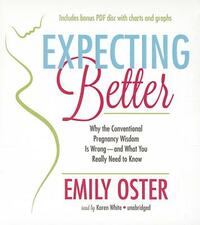You need to sign in or sign up before continuing.
Take a photo of a barcode or cover
1.46k reviews for:
Expecting Better: Why the Conventional Pregnancy Wisdom Is Wrong--And What You Really Need to Know
Emily Oster
1.46k reviews for:
Expecting Better: Why the Conventional Pregnancy Wisdom Is Wrong--And What You Really Need to Know
Emily Oster
I absolutely, and highly, recommend this book to any expecting parents, especially pregnant women. My wife had so many questions whilst she was pregnant and many sources, in print and on the internet, had conflicting advice. What foods can’t she eat? and more important why can’t she eat them? are cats really that dangerous to a pregnant woman? how much weight should she gain? what about medication during this period?
The best thing about the book for me what her unique style, which is built on two ….. First, her academic, in economics, background. She starts each topic with an impressive literature review of the topic where she later breaks it down into major concrete findings, disagreements, strengths and weakness, much like what you find in PhD theses and peer-reviewed academic papers. Her economics backgrounds, strong in statistical methods and pattern identification approach, aided in building impressive findings and conclusions; in addition to a few great graphs. The second was her personal stories scattered throughout the book, somewhere insightful and most hilarious. Her Husband seemed to be an absolute bum, and I loved how she complained about him in different colours each time. Remind me of myself. These small caveats provided breathing bubbles and relatable connections throughout the book.
Overall, a great insightful book that has an easy reading style, a unique academic approach to the topic and answers many questions that occupy everyone involved in the pregnancy “journey”, specifically pregnant women. What differentiates this book further is the way the answers are delivered. A literature review approach is utilised to layout the landscape was confirmed and repeated findings are distinguished from those lacking repeated confirmed results, weak sampling methods conflated conclusions, … etc. Hence, as a reader, you are not taking the research findings at face value, but instead, you are understanding the nuances of different approaches, and remedies suggested by the research. With this approach, I found myself not only frequently correcting others but breaking down how they were wrong, which research leads them to this conclusion and which issues are largely still an open question.
The best thing about the book for me what her unique style, which is built on two ….. First, her academic, in economics, background. She starts each topic with an impressive literature review of the topic where she later breaks it down into major concrete findings, disagreements, strengths and weakness, much like what you find in PhD theses and peer-reviewed academic papers. Her economics backgrounds, strong in statistical methods and pattern identification approach, aided in building impressive findings and conclusions; in addition to a few great graphs. The second was her personal stories scattered throughout the book, somewhere insightful and most hilarious. Her Husband seemed to be an absolute bum, and I loved how she complained about him in different colours each time. Remind me of myself. These small caveats provided breathing bubbles and relatable connections throughout the book.
Overall, a great insightful book that has an easy reading style, a unique academic approach to the topic and answers many questions that occupy everyone involved in the pregnancy “journey”, specifically pregnant women. What differentiates this book further is the way the answers are delivered. A literature review approach is utilised to layout the landscape was confirmed and repeated findings are distinguished from those lacking repeated confirmed results, weak sampling methods conflated conclusions, … etc. Hence, as a reader, you are not taking the research findings at face value, but instead, you are understanding the nuances of different approaches, and remedies suggested by the research. With this approach, I found myself not only frequently correcting others but breaking down how they were wrong, which research leads them to this conclusion and which issues are largely still an open question.
funny
informative
lighthearted
fast-paced
Really informative, feels non-judgey, obviously still some bias but overall really solid read and I am beyond impressed with all the research that went into this book!
hopeful
informative
medium-paced
Definitely found a lot of value here and also just felt like this excelled at being demystifying. I found the lack of harm reduction mentions for tobacco users to be a bit frustrating, especially given the acknowledgements that tobacco is really hard to quit and the (perhaps cheeky) shout out to buprenorphine over methadone. Oh also her not thinking there are genetic differences in whether people should be drinking directly contradicting her theory of why alcohol is bad in high doses drove me up a wall. Probably don't drink during pregnancy if you have Asian Flush! Also her calculation that having a baby with down syndrome was like thousands of times worse than miscarrying was kind of disturbing to me and her husband comes off as a real piece of work occasionally. Glad we read it and look forward to referencing it in the future, including hopefully for birth plan drafts.
Graphic: Ableism
I had been meaning to read this for forever, and I'm glad I finally did! I knew of Emily Oster from my J-PAL days, where I helped draft a policy brief about her menstruation in Nepal study (which gets a mention in the book!). Woo! That was 2011 or so, and I remember, when this book came out, being like, "Oh, she wrote a pop econ book? Oh wait, it's about pregnancy?!"
While I tend to think that high-flying economists (which Oster definitely is one!) have a TOO HIGH tendency to assume that, since they're high-flying in economics, they must be good at everything, I do - at the same time - agree with her basic assumption that having a background in academic economics gives you a useful decision making paradigm and some general literacy for reading academic articles and parsing quantitative research. Oster turns those skills to the Pregnancy Industrial Complex (PIC), and it's great - doctors do, after all, have a strong incentive towards being conservative, for fear of malpractice and generally things going tragically wrong. Patients, likewise, have a tendency towards imperfect compliance. And thus we have blanket, all-or-nothing statements about alcohol, caffeine, and so on.
This book is basically a giant lit review of pregnancy-related medical research, written in a fun, warm, pop tone. I found it mostly heartening and reassuring since, well, the PIC is scary and there is SO MUCH social judgment around pregnancy and parenting. Everyone seems to have found Jesus on this topic, and it's hard to separate fact from passionate belief. To epidural or not to epidural, etc. To that end, I liked that Oster offers (mostly) non-judgmental information and advice, with the overall message being, "You have your own risk tolerance, here are the facts."
While I tend to think that high-flying economists (which Oster definitely is one!) have a TOO HIGH tendency to assume that, since they're high-flying in economics, they must be good at everything, I do - at the same time - agree with her basic assumption that having a background in academic economics gives you a useful decision making paradigm and some general literacy for reading academic articles and parsing quantitative research. Oster turns those skills to the Pregnancy Industrial Complex (PIC), and it's great - doctors do, after all, have a strong incentive towards being conservative, for fear of malpractice and generally things going tragically wrong. Patients, likewise, have a tendency towards imperfect compliance. And thus we have blanket, all-or-nothing statements about alcohol, caffeine, and so on.
This book is basically a giant lit review of pregnancy-related medical research, written in a fun, warm, pop tone. I found it mostly heartening and reassuring since, well, the PIC is scary and there is SO MUCH social judgment around pregnancy and parenting. Everyone seems to have found Jesus on this topic, and it's hard to separate fact from passionate belief. To epidural or not to epidural, etc. To that end, I liked that Oster offers (mostly) non-judgmental information and advice, with the overall message being, "You have your own risk tolerance, here are the facts."
funny
informative
reflective
medium-paced
funny
informative
Excellent, research backed baby book. Takes you through all of pregnancy and birth and just gives you the information without asserting opinions.
informative
medium-paced
In-depth statistical analysis of common questions for pregnant women, such as the advisability of caffeine, right up to the pros and cons of home birth. Oster lays out the facts, as found in medical research, while telling the story of her own data-driven pregnancy. A great resource for anyone faced with the myriad choices involved in getting through pregnancy and childbirth.



